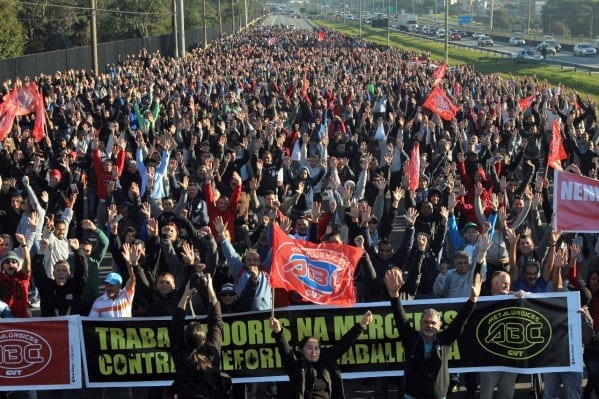Following the deadly mining dam collapse in January that buried alive 186 workers and residents of the town of Brumadinho, Brazil, and concurrent legislative attacks on worker rights, unions representing members across Brazil are requesting the Inter-American Commission on Human Rights (IACHR) investigate and address both issues.
The Vale-owned dam, which sat above Brumadinho, was held back by little more than walls of sand and silt, and is among 87 similarly constructed mining dams in the country. More than 131 people have not been found, and the “tidal wave of waste and mud that engulfed homes, businesses and residents” also wreaked enormous damage to the environment. The United Nations has said the disaster “must be investigated as a crime.”
The Brumadinho collapse, one of the worst mining disasters in the country’s history, follows a 2015 iron-ore dam collapse at another Vale mine that killed 19 people. Both catastrophes are the direct result of the privatization of Brazilian companies, a process that often results in precarious and dangerous working conditions, says Maximiliano Nagl Garcez, an attorney representing the unions.
Privatization in Brazil’s strategic sectors “means disrespect for international treaties, a threat to the country’s national and energy sovereignty and, above all, an enormous risk to the health and safety of thousands of workers at risk with negligence to their condition, to the detriment of an ever-increasing profit in the interests of large multinationals,” he says. Garcez will present the unions’ requests for investigations during the IACHR meeting in Jamaica in May.
Attacks on Worker Rights, Environment Connected
The mining collapse took place in an environment of stepped-up legislative attacks on land, community and worker rights, including the abolition of Brazil’s Labor Ministry and the transfer of oversight of indigenous lands and the forestry service to the Agriculture Ministry.
Most recently, the government enacted a “temporary law,” a measure typically reserved for emergencies, that changes the process of union dues collection. The impact of the new law is clear, says Garcez: It will destroy the financial viability of trade unions, undercutting their ability to effectively oppose the anti-worker government. These and other measures are a direct threat to workers’ right to freedom to form unions, he says.
The Central Union of Workers in Brazil (CUT) and other unions and organizations are requesting the IACHR address the attacks on worker rights, and Garcez requested hearings during upcoming IACHR investigations.
The Brazilian Bar Association this week challenged the measure to change union dues collection, and the country’s supreme court will hold a hearing on its constitutionality next week.

